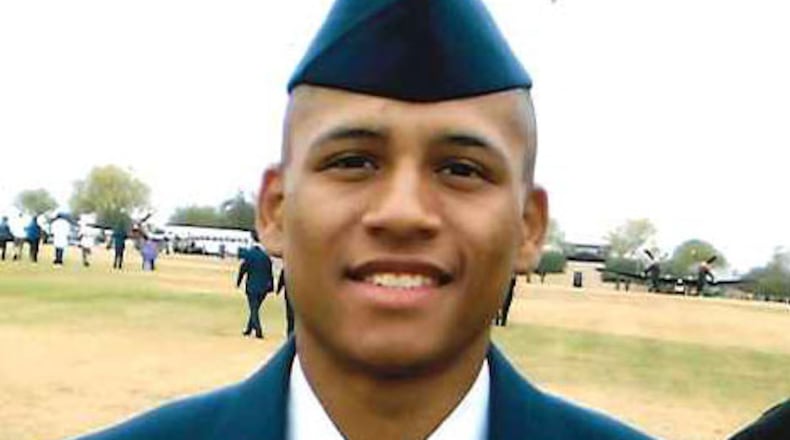Anthony Hill was his usual, optimistic self the last time his mother talked to him on the telephone.
They discussed his plans to attend barber college and her upcoming visit to Atlanta to celebrate his 28th birthday. Though the U.S. Air Force veteran had been diagnosed with bipolar disorder and struggled to find the right medication to treat it, there were no signs of the trouble that lie ahead.
Less than 24 hours later, Carolyn Baylor-Giummo received word that her son — who survived a tour of duty in Afghanistan — was dead, shot twice in the chest by a DeKalb County police officer. The shooting, coming on the heels of similar incidents in Ferguson, Mo., and Staten Island, N.Y., where young unarmed black men died at the hands of law enforcement, has sparked a lingering national debate over alleged racial profiling and excessive use of force.
The morning after, on March 10, Baylor-Giummo, accompanied by her daughter and brother, made the nearly five-hour drive from tiny Moncks Corner, South Carolina to Hill’s Chamblee apartment. She quietly collected her son’s belongings, unnoticed by protesters who had began to gather outside,
“I couldn’t comprehend it,” Baylor-Giummo told The Atlanta Journal-Constitution on Wednesday. “Why would they shoot and kill my son?”
She still struggles to make sense of it all. Anthony, her eldest child and only son, was raised to respect authority, she said, and he had no previous run-ins with the law. Hill had even interned with the Berkeley County Sheriff’s Office in South Carolina after graduating from high school and wasn’t shy about defending law enforcement.
“If 99 out of 100 cops (are) killing black men like its hunting season that leaves 1 just doing his job,” Hill, an African-American, tweeted in December.
Hill was just as upfront about his condition, and his struggles in dealing with it.
His medication made it difficult to sleep, his mother said, and there were other burdensome side effects. But on the morning of his death, nothing seemed amiss. His roommate said he seemed upbeat.
But that would soon change. Hill, left alone, emerged from his apartment around lunchtime, wearing no clothes, huddling on all fours. He began knocking on neighbors’ doors, but threatened no one, said Christopher Chestnut, the attorney for Hill’s family.
Officer Robert Olsen was dispatched to The Heights apartment complex after residents called 911 reporting a suspicious person.
Hill was still nude, and unarmed, when Olsen, a seven-year veteran of the DeKalb force, arrived on the scene. Witnesses said Hill was walking briskly toward the officer, who ordered him to stop. Hill did not heed the command, but his gait slowed, Chestnut said, his arms either outstretched or over his head.
“He still believed police were there to protect,” Hill’s mother said.
Pat Strode, program administrator for the Georgia chapter of the National Alliance on Mental Illness, said it’s likely Hill was seeking help from Olsen.
“It could have been in his mind, ‘He’s an officer. He’s here to keep me safe. The faster I can get to him, the better,’” said Strode, who helps train law enforcement on how best to deal with mentally ill suspects.
Although mental health advocates say DeKalb lags behind other metro Atlanta agencies in such training, Olsen had completed a week-long Crisis Intervention Team class in 2009. In it, officers are encouraged to engage people in conversation – “trying to ground them in reality as quickly as you can,” without resorting to lethal force, said Strode.
Chestnut said Olsen made no such attempts on March 9. He said Hill was 182 feet away from the officer when he first made the command to stop — “ample time for a situational assessment.”
It’s unclear how much distance separated the two men when Olsen fired his gun. A GBI investigation into the shooting is ongoing.
Perhaps the biggest lingering question for family members remains: Why didn’t Olsen use his Taser?
“Lethal force should be the last resort,” said Theola Baylor, Hill’s grandmother. “It should not be the first response.”
As for Olsen, “I pray for him,” Baylor said.“The question is why. We still don’t understand why.”
Baylor-Giummo said she refuses to be held captive by hate.
“I’m not angry at (Olsen),” she said. “I’m angry about how it happened. I want to speak with a clear mind, a clear heart.”
They take solace in their memories of the quiet, polite young man who read vociferously and never met a stranger.
His funeral, held last week in Moncks Corner, had to be moved to the a high school auditorium to accommodate all the mourners, his mother said.
She remembered that the day she cleaned out her son’s apartment, a little girl who lived in the complex approached and gave her a hug.
“He was my friend,” she told Baylor-Giummo.
About the Author
The Latest
Featured


